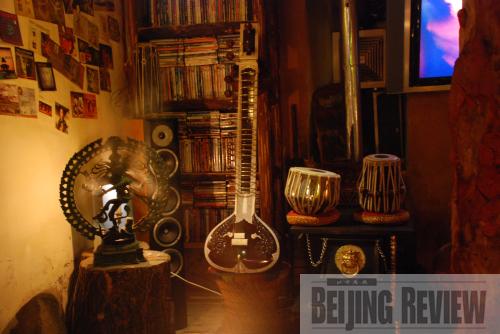|
 |
|
LHASA NIGHTS: A view inside the bar Low House (WU BIAO) |
With a curly hair braid, tattoos on his exposed arms and a scarf across his shoulders, Peng Peng looks like a Tibetan rock star.
Only his accent betrays the truth. "I am from Beijing," said Peng Peng, whose real name is Zhang Peng. The 29-year-old came to Lhasa four years ago as a tourist, but his brief visit turned into four years. "I never thought I would stay here at first, but I just did. Even now, I cannot give a clear reason. I just don't feel like leaving."
Since March 2009, he has been the owner of the bar Music Paradise, which sits on a lane populated with other small bars along Beijing East Road.
The Beijing East Road, about 15 minutes' walk east from Potala Palace, is regarded as the most active area of Lhasa. It is home to most of the bars and the two biggest backpacker hostels—Banak Shol Hotel and Dongcuo International Youth Hostel. In September and October, the travel season in Tibet, the area is always packed with tourists from all over the world. It comes alive as night descends and the lights of the bars dotting the road suffuse the area with their electric glow.
"Lhasa is just like a town in other parts of China, but it is the most international one in my eyes, even more than Beijing and Shanghai," said Guo Ying, a tourist from Shanghai staying in the Banak Shol Hotel who visited almost every bar in Lhasa.
The most international, according to Guo, not only refers to the number of countries from which tourists hail, but also the open attitude of the visitors. "You can make friends very easily here, and there are no strangers in Lhasa. We share stories and it is just fun," said Guo. In her eyes, the Tibetan-style decoration of the bars is one of the great attractions. "It just gives me very different feelings. Although we have several Tibetan-style bars in Shanghai as well, here, as the source for that style, it is very unique. Walking into the bars, I was just soaked in the strong cultural atmosphere."
Zhang, however, holds different ideas in this respect. "There are quite a few bars in Lhasa with Tibetan culture as a theme," said Zhang. "It is a theme that is a bit heavier and if the owner does not do it properly, it would be too superficial. I want to make the bar more entertaining."
After taking over the Music Paradise bar, Zhang made some changes, including adding to the styles of music played there. He added folk, rock & roll, reggae, hip-hop and pop songs to make the bar more entertaining. He said the change provides guests with a rich or even legendary experience.
The charm of small bars is more about the character of the owner than the atmosphere it creates, Zhang said. He said Wang Xiao, the owner of a bar named Nian, is such a character.
A rock player from Xi'an, Shaanxi Province, Wang traveled all around China and other countries around the world and finally settled down in Lhasa to create "pure rock music." The man who sports a goatee plays guitar every night in the always packed bar. Guests can play with him by picking up the musical instrument hanging on the wall.
If Nian's attraction is about the live music show, the Low House brings them in based just on the music itself. It has become famous for having the music that people have been seeking for a long time. The bar is hidden in a lane that can be easily missed. The owner, 38-year-old Wu Biao, came to Lhasa in 2005 from Lanzhou, capital of Gansu Province, after losing his job.
"I didn't plan to open a bar at first," he said. "I spent a couple of months renting a place to stay and finally I got this house, which has a 150-year history."
Only after he saw the old house did he consider opening a bar and sharing the music he has been collecting for years.
"Music is the soul of a bar," said Wu. Befor he opened the Low House, Wu collected Tibetan and Indian music CDs. When he opened for business, he relocated his collection to the bar. Guests started buying the CDs, which Wu gradually turned into another business. Now when business gets quiet, he travels to India and Nepal to collect more.
"A local told me that people hanging out at night in Lhasa can be divided into three categories—those from other places that will go back, those that will not go back and local Tibetan youngsters," said Ge Ge, a girl from Dali, Yunnan Province, who goes to Tibet at least twice every year.
| 